
HP Victus 16 review: This 16-inch gaming laptop delivers solid value
HP's Victus 16 gaming notebook keeps your focus on the screen, not what's under your fingers.
Pros
- Very good value
- Surprisingly comfortable keyboard
- Large 16-inch 1080p screen with a high 144Hz refresh rate
Cons
- Budget RTX GPU
- Audio doesn't feel quite right
- Display hinge is a bit flimsy
Bottom Line
A low sticker price helps usher this budget 16-inch gaming laptop into a select circule of gaming notebooks worth buying.
-
Price
$ 2,299.00 (AUD)
Price when reviewed
AU$2,299 at HP
The HP Victus 16 joins a small but growing crop of gaming notebooks whose solid, comfortable keyboards are surrounded by a clean, minimalist design aesthetic. These elements make them suitable for work as well as play. Combine that with the relatively inexpensive AU$2,299 price tag and you get a recipe for an intriguing midrange gaming notebook that won't hit your wallet too hard.
Yes, HP tossed the RGB bling out the window. That said, we weren't overly impressed by the audio and the included GeForce RTX 3050Ti GPU certainly falls on the low end of the GeForce RTX 30-series spectrum. Still, the Victus 16 delivers substantial value for a mainstream gaming PC.
HP Victus 16 basic features
HP's Victus essentially replaces HP's Pavilion Gaming brand. The V logo is extracted from the diamond used by its more hardcore Omen gaming brand. Essentially, it's a gaming PC designed for a variety of tasks, which is reflected by both the badging and design.
In Australia the Victus 16 ships in one configuration and in two colours from HP.com: the d0175TX and d0173TX. Both configurations have Intel Core i7-11800H and NVIDIA GeForce RTX 3060 with 16GB RAM. Each cost AU$2,299.
- Processor: Intel Core i5-11400H, Core i7-11800H (i7-11800H as tested)
- Display: 16.1-inch (1,920×1,080, 144Hz), 300 nits rated (as tested); 16.1-inch (2,560×1440, 165Hz), 300 nits
- Memory: 8/12/16/32GB DDR4-2933; 16GB (2x8GB) as tested
- Storage: 256GB/512GB/1TB PCIe SSD, with 32GB Optane options; 512GB PCIe NVMe M.2 SSD + 32GB Optane as tested
- Graphics: GeForce RTX 3050Ti (4GB)/ RTX 3060 w/6GB GDDR6 (as tested)
- Ports: 1 USB-C (5Gbps, DisplayPort 1.4, charging); 3 USB-A (5Gbps, 1 w/charging enabled); HDMI 2.1, Gigabit Ethernet, SD card slot, 3.5mm jack
- Camera: User-facing: 720p video
- Battery: Design: 70.2Wh; Full: 65.2 Wh
- Wireless: Wi-Fi 6 (802.11ax 2×2), Bluetooth 5.0
- Operating system: Windows 11 Home
- Dimensions: 14.57 x 10.24 x 0.93in
- Weight: 5.44lb (2.47kg)
- Color: Mica Silver (as reviewed), Performance Blue, Ceramic White
- Prices: AU$2,299
Out of the box impressions and build quality
Some gaming laptops go overboard in pushing the gamer experience, with RGB lighting draped all over the keyboard. The Victus 16 is much more subtle, with our review unit boasting a black-on-black aesthetic that emphasizes what you see on the screen more than anything else. At 2.47 kilograms and 0.93 inches thick, it doesn't feel overly imposing. The weight is slightly heavier than another 16-inch gaming notebook we reviewed, the Acer Predator Triton 500 SE, which costs significantly more but also includes a higher-resolution screen with a faster refresh rate.
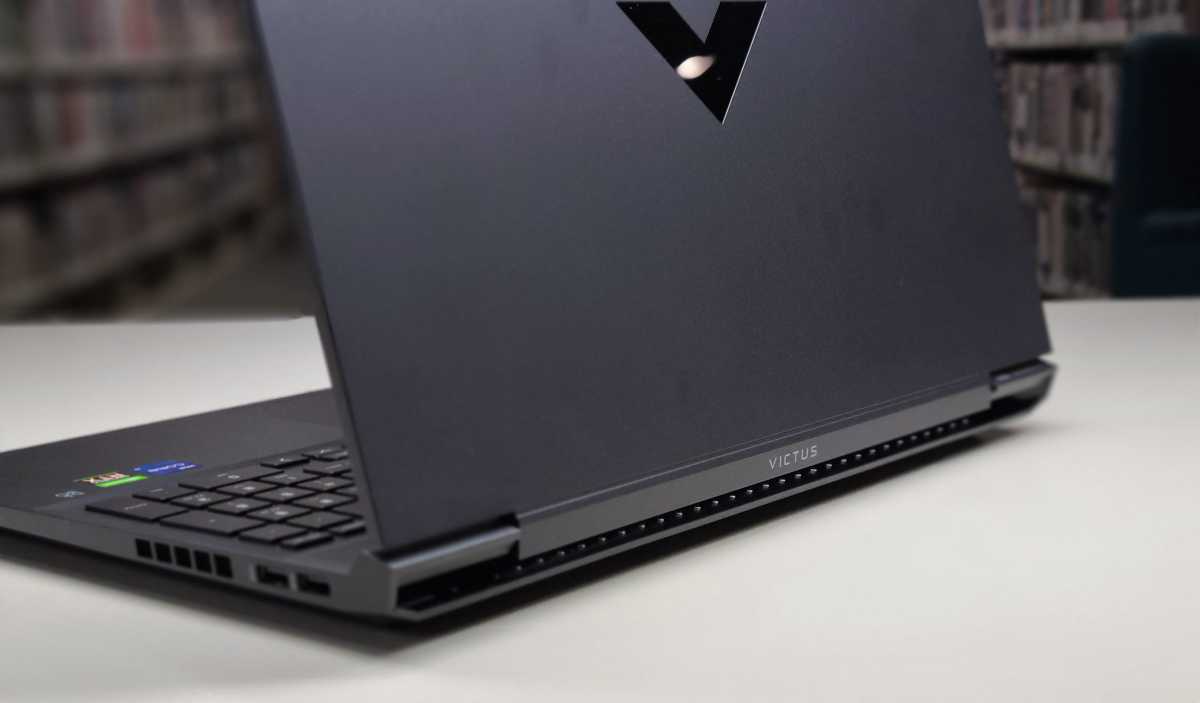
In my book, that's a real plus. We haven't quite realized a future where thin-and-light laptops are docked into external graphics enclosures to mix-and-match productivity and gaming, so PCs like the Victus fill that niche instead. By default, the laptop runs coolly enough that the system fans suck air out of the bottom of the laptop and push it out the sides and back. Inside, the Victus contains four heat pipes, boasting what HP says is a 54 percent larger fin length, 33 percent larger fan size, and 30 percent more airflow than the prior Pavilion Gaming notebook.
In the real world, this translates into a very quiet hiss as the fans spin during office work like web browsing, just barely louder than other productivity notebooks I have around the office. Naturally, the fans dial up considerably during gaming. If you'd like, you can tap the diamond key near the power button to open the Omen Gaming Hub. There, you'll find a one-button Performance Control tab to manually place the laptop in Quiet mode for office work, as well as the separate Default or Performance modes for gaming.
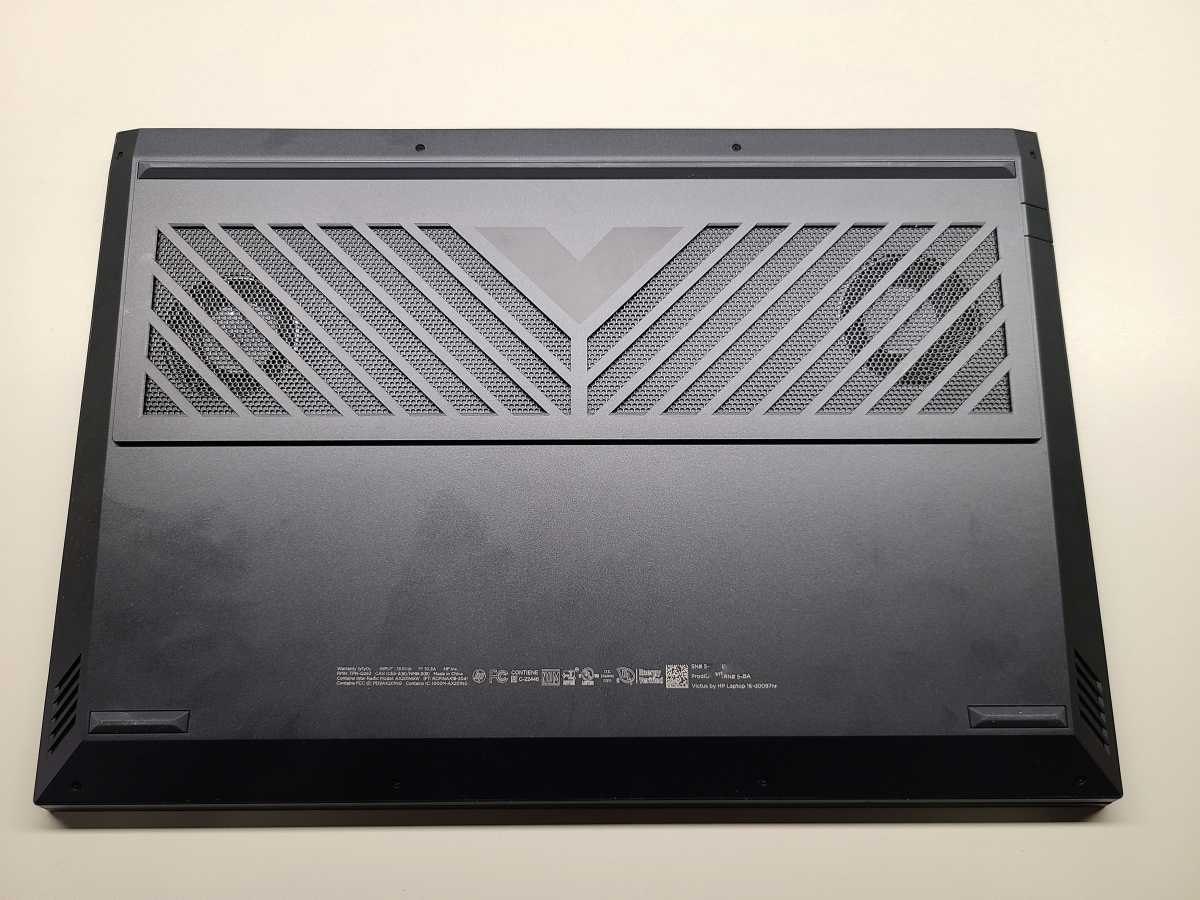
Even when the fans rotate at full speed, however, I couldn't detect any coil whine — just an elevated whoosh of the system fans. HP has done well here. As our performance tests indicate, though, the laptop's performance somewhat drops over time due to thermal issues.
The Victus is an all-plastic laptop, which feels sturdy enough to use without any give on the keyboard. The display can oscillate back and forth when jarred or moved, however, especially when it's being adjusted back and forth. That didn't concern me particularly, though it felt a little flimsy.
The display isn't outstanding, though it's not bad for the price. The display bezels doesn't protrude more than a few millimeters, though there's a massive 1-inch chin at the bottom. The screen-to-body ratio is 84 percent.
Remember, traditional laptops usually fall either into the 15-inch or 17-inch category, so this 16-inch (or as HP puts it, a 16-inch in a 15-inch form factor) is somewhat unusual. HP offers display options that range from 1080p (250 nits) at the low end up to 1080p at 144Hz (300 nits) inside our review unit, without HDR capabilities. HP also sells a 1440p screen option at 165Hz for an additional $110, offering a higher-resolution screen at a better refresh rate. By our measurements, the 300-nit screen dramatically overperformed, putting out 360 nits at maximum brightness. Our colorimeter reported that the display offered 100 percent of the sRGB color gamut, but fell short in other areas.
Our review unit did not include a touchscreen display, an uncommon feature on gaming laptops.
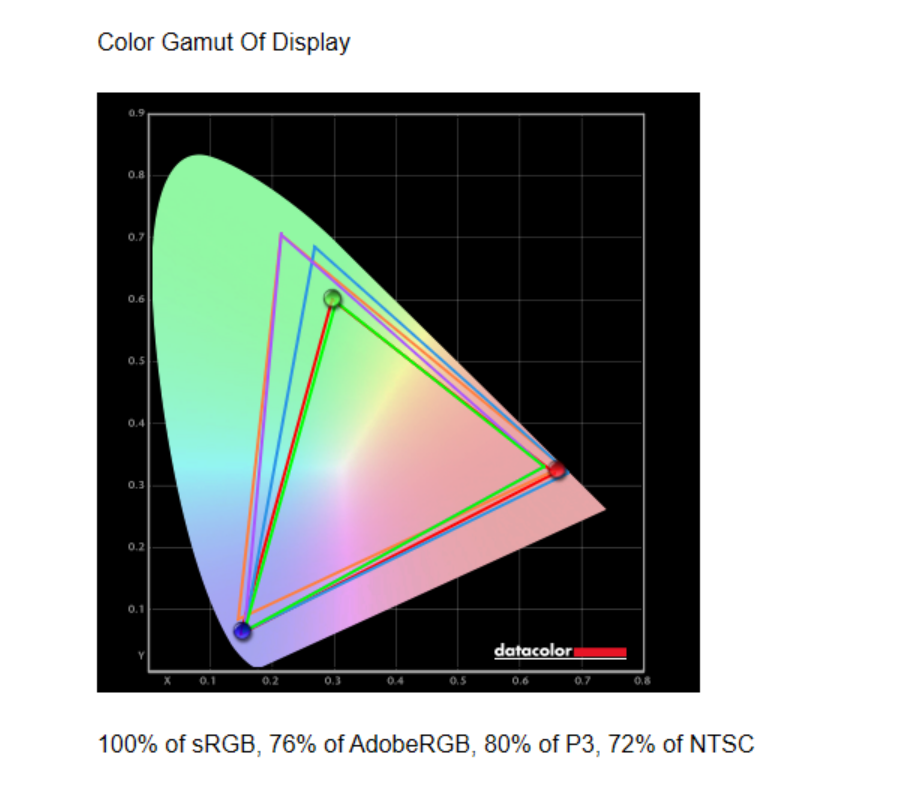
You'll have a variety of memory and storage options from which to choose, available from HP's configuration page. There are two options that aren't well spelled out, above. First, you have a specific option to configure two 256GB SSDs together in an RAID 0 configuration, where data is striped across both drives for improved performance. Second, HP offers Optane storage as a sort of cache for the hard drive, theoretically increasing storage performance a bit more.
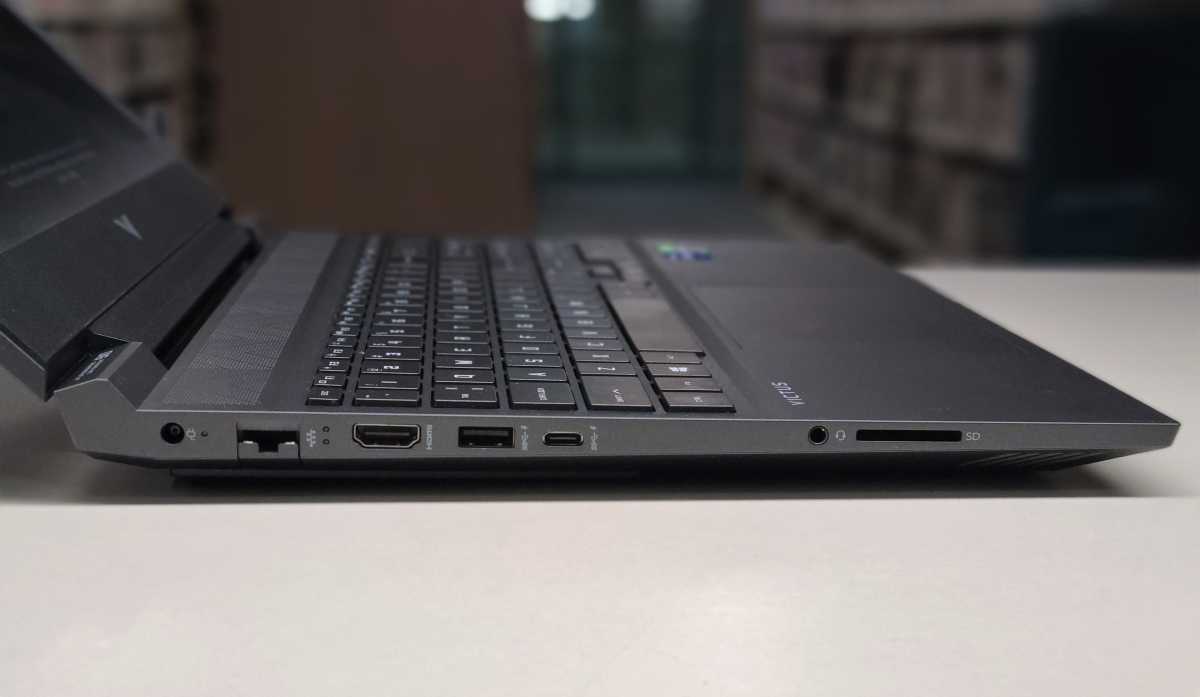
The Victus includes one 5Gbps USB-C (with DisplayPort 1.4 and Sleep and Charge capabilities), an HDMI 2.1 port, and three USB-A (5Gbps) ports, one of which is Sleep and Charge-capable. A Jaws-style Gigabit Ethernet port makes an appearance, too. That allows it to connect to a pair of 4K displays, one via the USB-C port and another via the HDMI connection. That essentially eliminates the need for a Thunderbolt port.
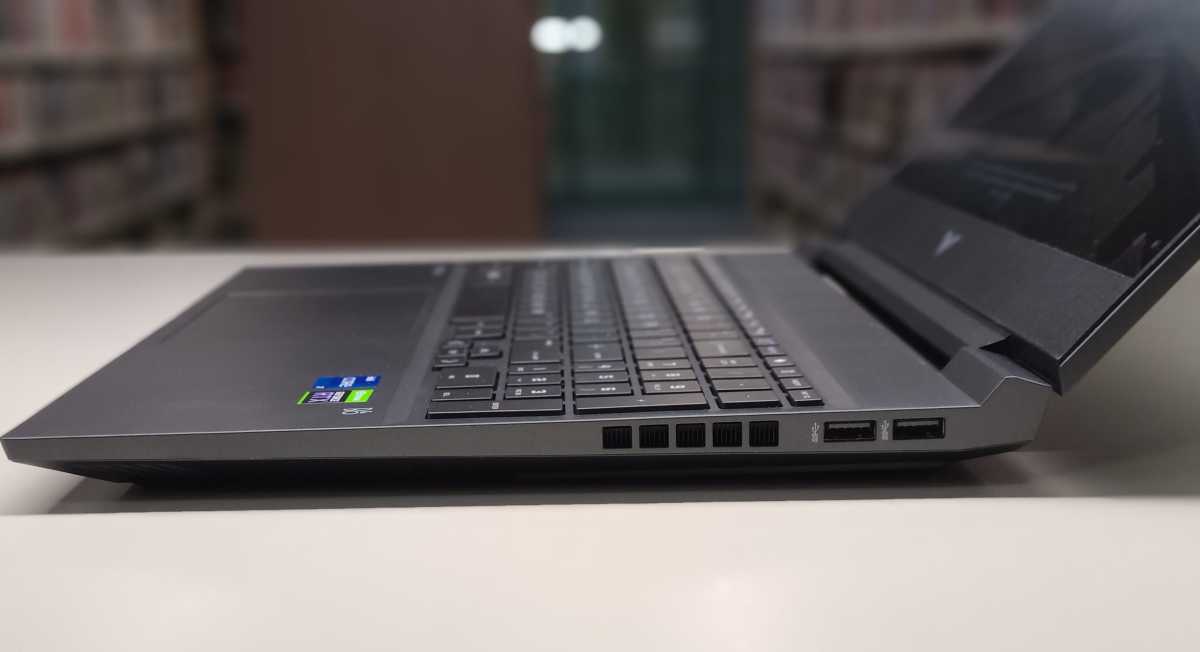
Typing experience, audio and webcam
While you'll never mistake the HP Victus for a productivity PC, the keyboard doesn't disappoint either. Perhaps to accommodate the keypad to the right of the keyboard, the key width appears to be perhaps a millimeter smaller than a productivity laptop. The pitch, or the gap between the keys, appears to be about the same. The smaller keys threw off my typing for a bit, though the springy, otherwise comfortable keyboard should be sufficient for typing a paper as well as orchestrating an MMO raid. The roughly 16:9 display ratio also allows HP to fit in a number pad on the right-hand side of the keyboard, a necessity for left-handed gamers.
HP has a legacy of good to even great keyboards and the Victus lives up to that reputation. I typed this review on the Victus keyboard and I can safely say I'd be relatively happy to use it on a long-term basis. Just don't expect RGB or even sophisticated backlighting, as there's only a single lighting level.
Otherwise, the keyboard is standard, though with the function-specific keys to launch the Windows calculator app as well as the Omen Gaming Hub described below. HP boasts that the touchpad is 19 percent larger than its Pavilion Gaming PCs. While it feels a little cheaper than the touchpads on productivity notebooks, the surface is smooth and the touchpad is essentially clickable over its entire surface.
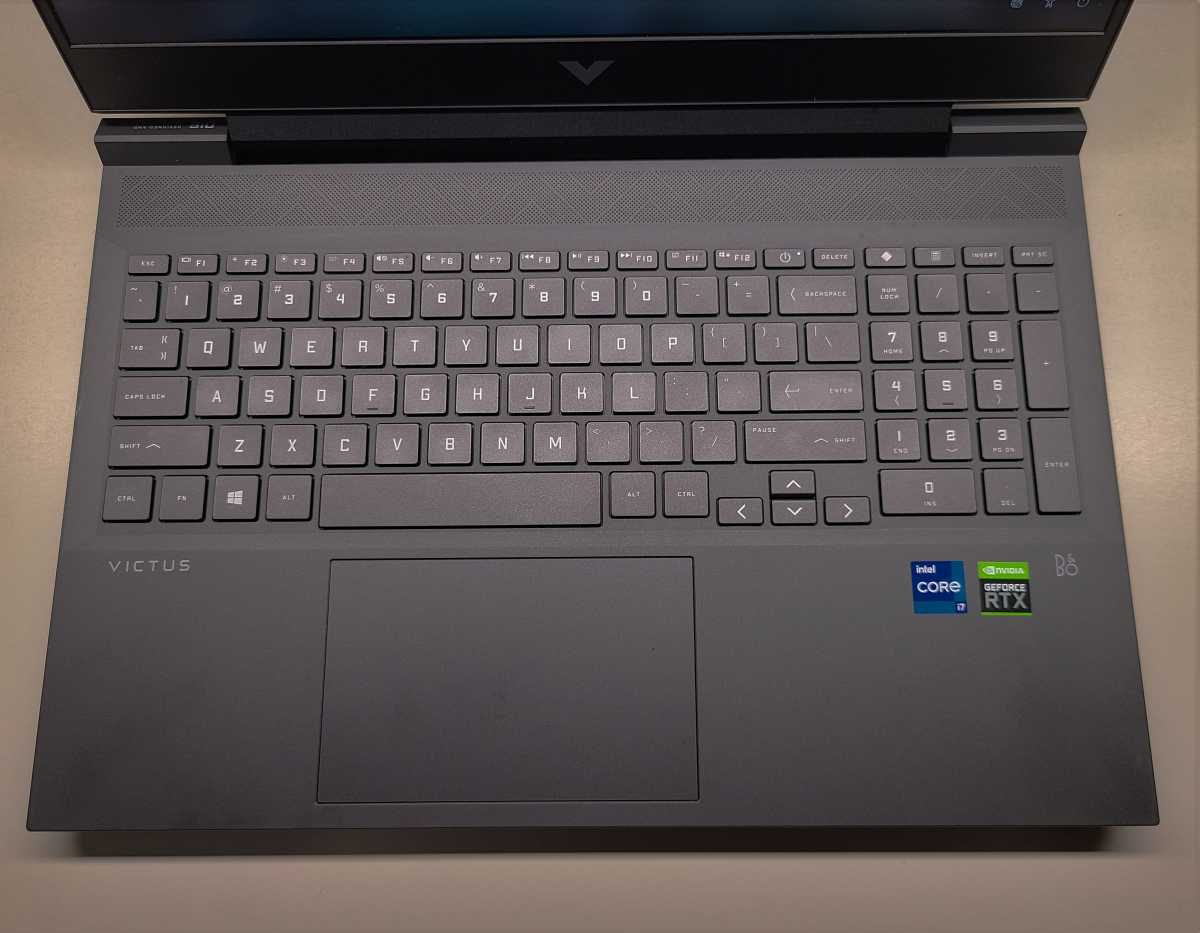
I found the HP Victus audio to be slightly disappointing. The dual speakers certainly put out enough volume. In fact, I had to turn the volume down slightly below the maximum for testing. HP asked Bang Olufsen to tune its speakers, as it does with many of its laptops. The resulting soundscape sounds a bit clunky, emphasizing the midrange though without the corresponding highs and lows. To be fair, using the built-in graphics equalizer within the BO Audio Control app certainly helped, but I was never quite able to find a mix that sounded quite right.
The Victus 16 also offers noise cancellation features for either videoconferencing or simply interacting with Cortana and other digital assistants. In general, these worked pretty well, though my home office is usually free of background noise.
As you might expect, the Victus 16's webcam ranges somewhere between mediocre to poor, with a 0.9Mpixel (720p video) user-facing sensor. The resulting image is grainy though with decent color balance and exposure. Don't expect much out of the webcam and you won't be disappointed. Windows Hello isn't supported either via the webcam or any other sensor on the laptop.
HP includes ten of its own apps on the HP Victus, ranging from HP Audio Switch, which replicates Windows' ability to switch speaker outputs, to myHP, a gateway to tips and tricks about the PC as well as selected third-party offers. HP also loads up the Victus with a 100GB Dropbox trial, an ad for ExpressVPN, a trial for McAfee LiveSafe and Personal Security, Disney+, Amazon.com and Amazon Alexa, and more.
One app worth trying out is the Omen Gaming Hub, a focal point for those who own HP gaming products as well as a dashboard for the Victus 16 itself. The Hub offers the opportunity to win rewards points and try out AI-powered coaching, a capability HP added two years ago. The dashboard offers a real-time look at the CPU and GPU utilization and temperature, plus the Network Booster (where you can assign specific networking priorities to apps and games) and the Performance Control, a replacement for the Windows 11 performance slider.
There's also a specific tab for undervolting, where you can try and reduce the CPU voltage (though not the clock speed) to try and save power. HP warns that this could be a risky choice, however, as even experimenting with it can lead to crashes and BSODs. We didn't test this feature.
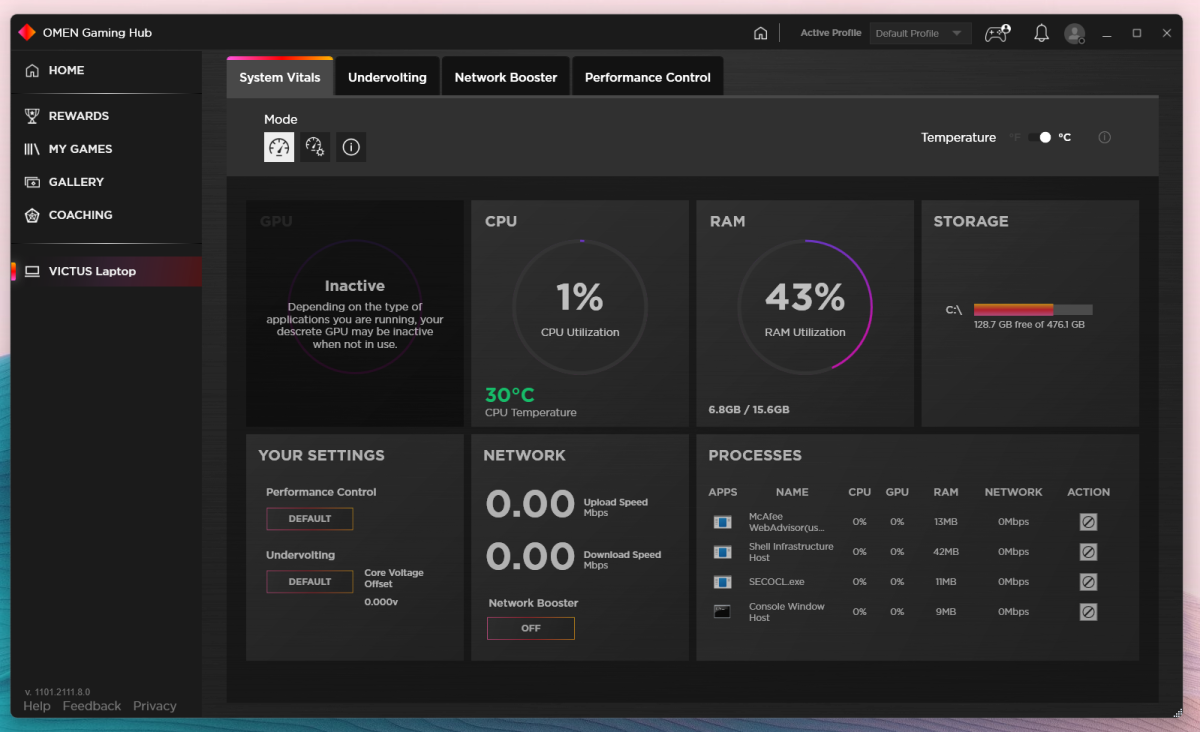
Performance
While the Core i7-11800H processor inside the HP Victus 16 is moderately powerful, the GeForce RTX 3050Ti is on the low end of the 3xxx series, though it can offer both RTX ray-traced graphics and DLSS 2.0 to budget notebooks, and that stands for something,
We compared the US$1,249 HP Victus 16 to several gaming laptops we've tested previously, most of which vary in some way. Our comparisons begin with our best 15-inch gaming laptop, the US$1,649 Asus ROG Strix G15 Advantage Edition, which adopts an all-AMD loadout and does so spectacularly. We also included the US$845 Acer Nitro 5 (AN515-54-51M5), our current pick for best budget gaming laptop (with a 15.6-inch display), as well as its up-to-date 2021 cousin, the US$1,700 Acer Nitro 5 AN515-45-R7S0. We also compared the HP Victus to the US$2,199 Gigabyte Aorus 17G, our best 17-inch gaming laptop and our pick for the best budget 17-inch gaming laptop, the (pandemic-fueled) US$2,800 HP Omen 17-cb0040nr. To this, we added the US$1,749.99 Acer Predator Triton 500 SE, a rival 16-inch gaming laptop. At US$1,299, the similarly named Acer Predator Triton 300 SE is about the same price as the HP Victus, though with just a 14-inch screen.
Remember, traditional notebooks often fall into either a 15-inch or a 17-inch notebook category, with the larger chassis typically allowing more space for additional cooling. We tested the laptop in default mode, which allows it to dial up the fan speed when needed.
We selected the PCMark 10 benchmark as an overall metric of the laptop's performance — useful, of course, if the laptop is being used for work during the day. The benchmark tests office scenarios like light gaming, word processing, and spreadsheets, as well as more intensive applications like CAD. We've only recently shifted to using this benchmark, so just a few of our gaming laptops have scores from this test. We can tell you that our pick for the best 14/15-inch workhorse laptop, the HP Envy 14, reported a PCMark 10 score of 5,330. The Victus blows it out of the water with a score of 7,007.
Cinebench R15 and R20 provide two different takes on the CPU performance the HP Victus offers, both while running the laptop in the mulithreaded benchmark as well as in just single-threaded operation. Although games have begun to take advantage of multiple cores and threads, there's still a heavy reliance on single-threaded operations for many traditional games.
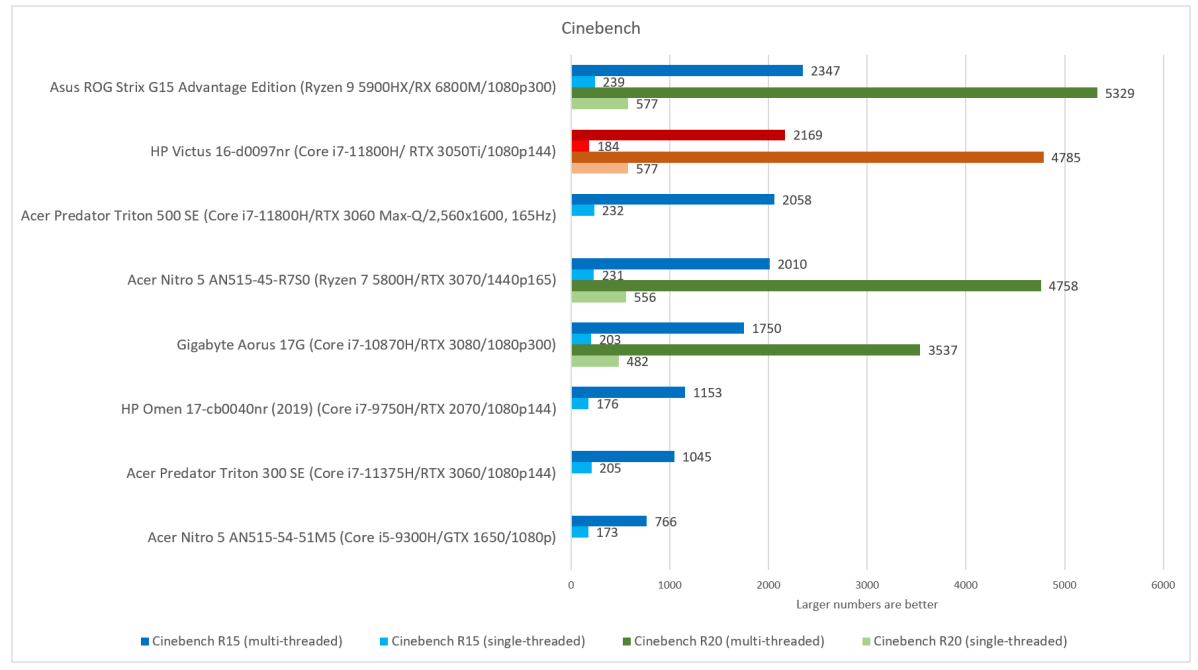
We also used Cinebench R23 to test the laptop for thermal throttling. The more advanced version of the Cinebench benchmark offers the ability to run a single test as well as loop the benchmark repeatedly. This test detects thermal issues that might throttle the CPU performance over time. Though HP touts its advanced cooling system, performance did drop by 14 percent (from 12,038 to 10,405) while running the looped benchmark.
We use Handbrake to test the laptop's cooling systems by transcoding a Hollywood-length movie into a format that can be used by a tablet. Although transcoding isn't as useful in a world where movies can be downloaded from Netflix, it's still an effective way of discerning how the Victus 16 manages heat while under load.
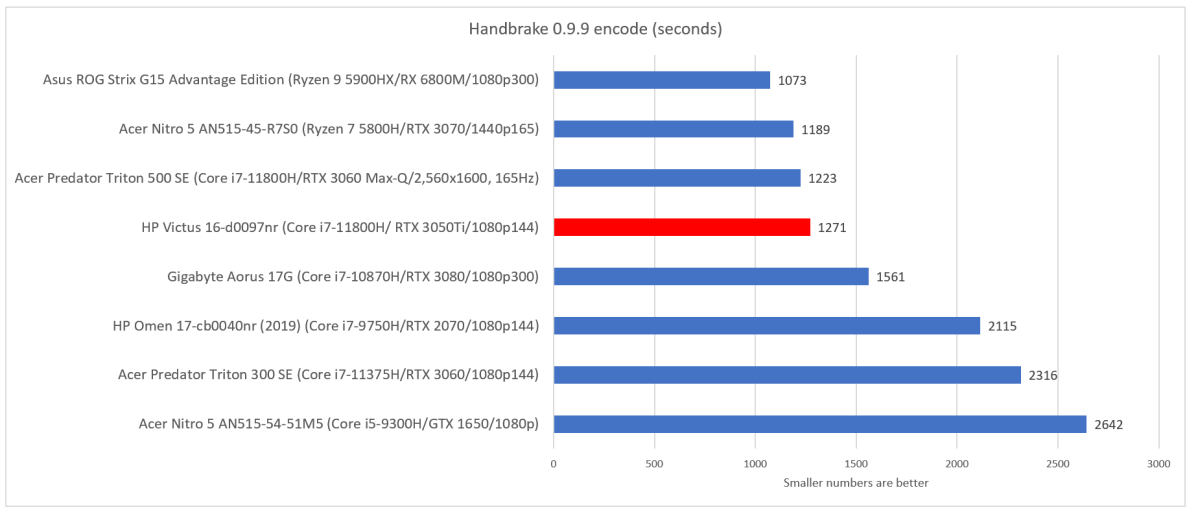
3Dmark offers a generic test of gaming performance outside actual games. The various Fire Strike benchmarks stress the Victus 16's RTX 3060 CPU. We've included both the Fire Strike and Fire Strike Extreme tests for a more comprehensive evaluation.
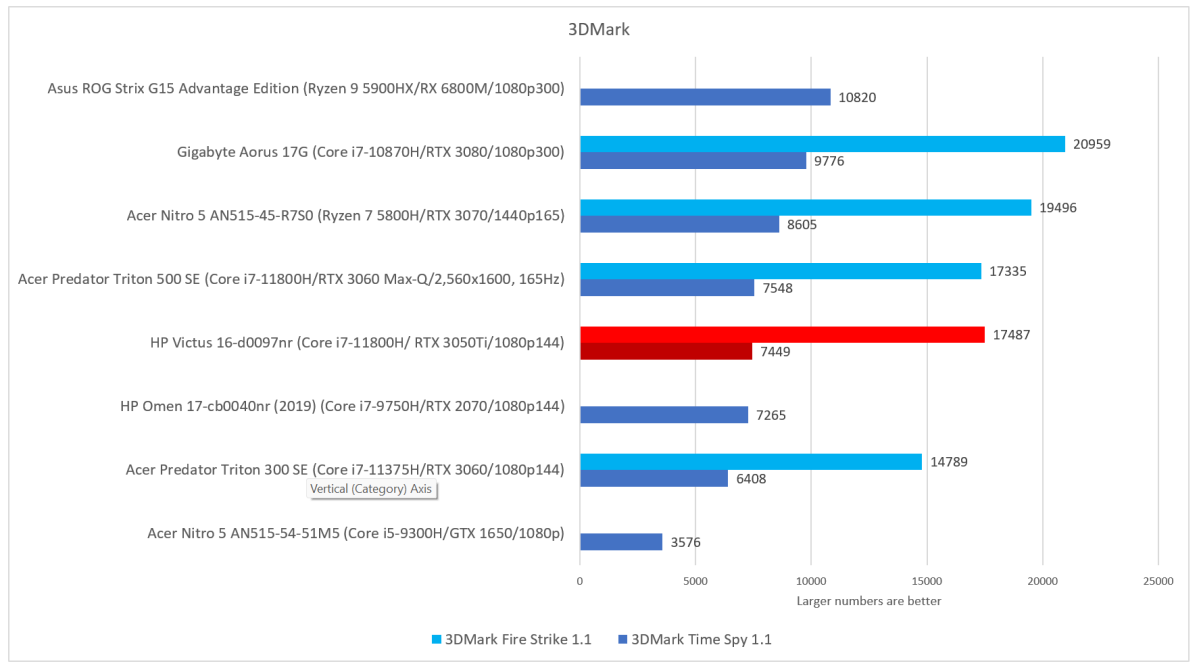
We also ran the Time Spy benchmark in a looped mode to test whether performance dropped over time here, too. 3DMark looks for and expects your laptop's 3D performance to remain consistent over time, even as the benchmark pushes the GPU (and, in part, its CPU) to its limits. Fortunately, this didn't occur, and the laptop delivered steady frame rates throughout.
Finally, there's battery life. As most gamers understand, a long, battery-powered gaming session isn't something gamers expect, but it's certainly nice to have in a pinch. Here, the Victus 16 delivers roughly five and a half hours of battery life, which isn't bad for a gaming notebook. However, it's somewhat below the competition. It also includes quick-charging capabilities. This laptop met HP's claim that it could charge up to 50 percent in about 30 minutes.
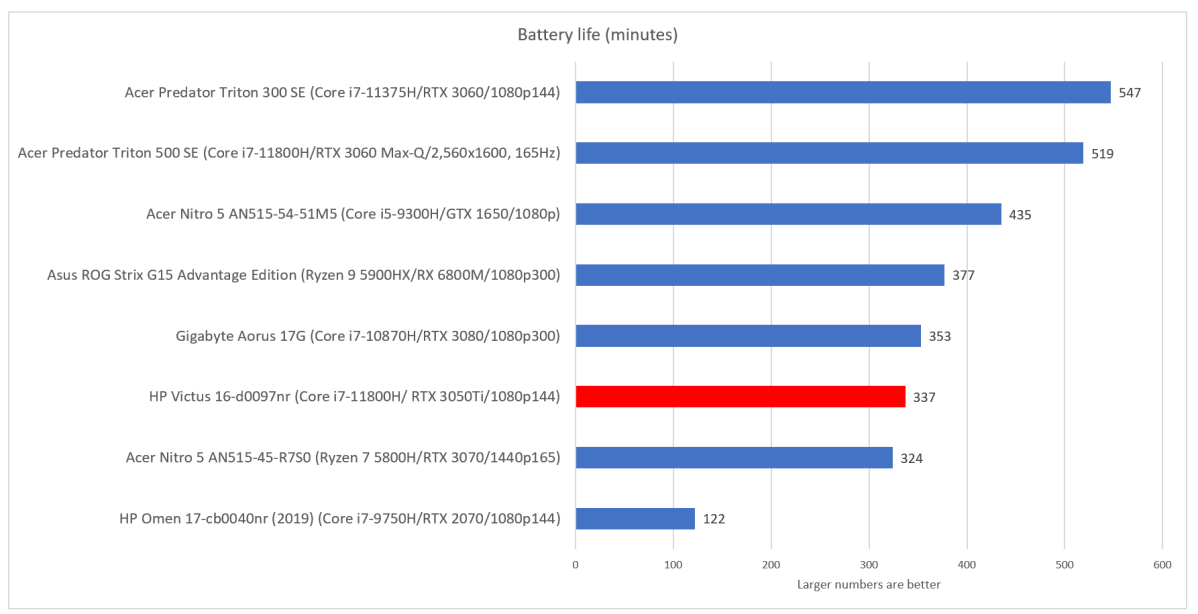
To test gaming performance, we used our traditional gaming benchmark, Rise of the Tomb Raider. The Victus 16 doesn't do too badly, here. We used similar settings with its more recent counterpart, Shadow of the Tomb Raider, and received similar results (95 FPS) with DirectX 12 enabled. Using DirectX 11, the benchmark score was 75 FPS.
On a more modern game, Metro: Exodus, the HP Victus 16 yielded a benchmark score of 29.9 FPS while running at 1080p Extreme settings. The Asus ROG Strix Advantage Edition recorded a benchmark score of 48 fps by comparison. Yet another Acer Nitro 5 (the AN517-41-R3NX with a Ryzen 7 5800H and an RTX 3080 GPU) recorded 42 frames per second. In general, we'd consider 30fps barely playable for slower-paced third-person games with most people preferring 60fps or more for first-person shooters.
Our results imply that the HP Victus 16 should be a solid contender for 1080p gaming, though you'll need to dial down the graphics quality in places.
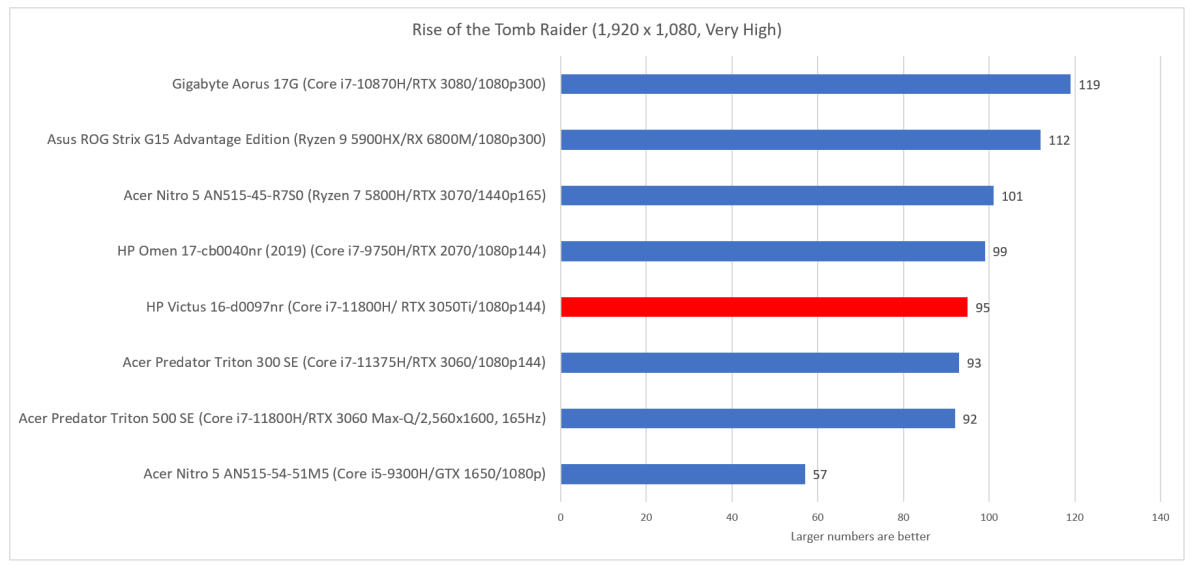
Image: Mark Hachman / IDG
Conclusion: Very good, just not the best
HP's Victus 16 clearly offers substantial value as a budget gaming notebook. The AU$2,299 price tag is worth applauding, especially with supply-chain woes gnawing at profit margins and availability. However, HP clearly sacrificed some of the bling of rival notebooks to deliver a no-nonsense gaming PC for users who care about what's on the screen rather than under their fingers. Laptops that can do dual-duty for work and play are worth highlighting, too.
To be fair, we'd probably award the Victus 16 an Editor's Choice award if not for the substantial contributions of the Asus ROG Strix G15 Advantage Edition and Acer Predator Triton 500 SE, both of which deliver spectacular performance and a higher-resolution screen with better refresh rates. Yet both notebooks also cost a few hundreds of dollars more. If that matters, the Victus 16 is a more budget-friendly option.
Of these notebooks we've tested, we think it's fair to day that we'd recommend the ROG Strix G15, the Triton 500SE, and the Victus 16. While the Victus 16 may not be your first choice for a gaming notebook, we still think it's a good choice nevertheless.
Brand Post

Most Popular Reviews
- 1 Dell U3223QE review: A winning debut for an IPS Black monitor
- 2 HP Spectre x360 16 review: The right 2-in-1 at the wrong time
- 3 Acer K242HYL review: An affordable monitor for any occasion
- 4 GeForce Now review: You bring the games, Nvidia streams the hardware
- 5 Asus ProArt PA279CV monitor review: The go-to for content creators on a budget
Latest News Articles
- Fortnite returns to the iPhone (sort of) courtesy Xbox Cloud Gaming
- iPad buying guide 2022
- Best Mac for music production
- Apple’s 3-meter Thunderbolt 4 cable for AU$249 is the only game in town
- Apple adds two popular classic iPads to ‘vintage’ list
Resources
Macworld
What's new, plus best mac-related tips
and tricks

Business Centre
The latest business news, reviews, features and whitepapers

Videos
Watch our video news and reviews from around the world

Guides
Comprehensive buying guides, features, and step-by-step articles

PCW Evaluation Team
Pedro Peixoto
Aruba Instant On AP11D

Set up is effortless.
Cate Bacon
Aruba Instant On AP11D

The strength of the Aruba Instant On AP11D is that the design and feature set support the modern, flexible, and mobile way of working.
Dr Prabigya Shiwakoti
Aruba Instant On AP11D

Aruba backs the AP11D up with a two-year warranty and 24/7 phone support.
Tom Pope
Dynabook Portégé X30L-G

Ultimately this laptop has achieved everything I would hope for in a laptop for work, while fitting that into a form factor and weight that is remarkable.
Tom Sellers
MSI P65

This smart laptop was enjoyable to use and great to work on – creating content was super simple.
Lolita Wang
MSI GT76

It really doesn’t get more “gaming laptop” than this.
Featured Content
- Which Lenovo Laptop Should I Buy?
- Every TV in Samsung's 2022 line-up: OLED, Neo QLED and more!
- Top 10 best Android and Apple phones for under $600
- Everything you need to know about Smart TVs
- What's the difference between an Intel Core i3, i5 and i7?
- Laser vs. inkjet printers: which is better?







